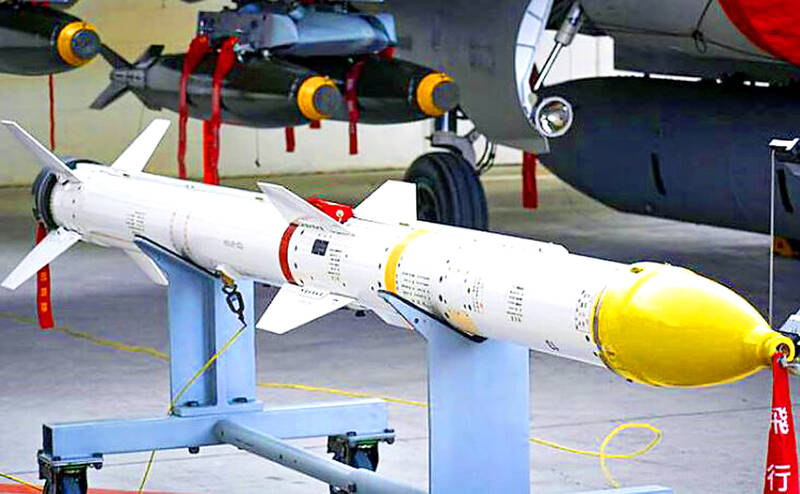The Chungshan Institute of Science and Technology has completed the development of a new air-to-air missile to arm the AIDC F-CK-1 Ching-Kuo Indigenous Defense Fighter jet, an official familiar with the matter said.
The Tien Chien III missile, designed for the Aerospace Industrial Development Corp’s (漢翔航空) Indigenous Defense Fighter, has superior range and speed over the Tien Chien II missile currently in service, the official said, speaking on condition of anonymity.
The new missile is expected to enter mass production next year, the source said.

Photo: Liu Yu-chieh, Taipei Times
Taiwan is mass-producing a land-launched version of the Tien Chien II and a ship-launched version, named Hai Chien II, with a special budget under the Sea-Air Combat Power Improvement Plan, they said.
The Ministry of National Defense has not yet disclosed the nomenclature for the Tien Chien II variant utilized by ground vehicles and batteries.
The air-to-air Tien Chien II and Tien Chien II-C missiles are being produced in a smaller volume utilizing funds drawn from the normal defense budget, the official said.
Previous reports saying that the institute referred to the land-based Tien Chien II and Hai Chien II missiles as Tien Chien III were incorrect, as they were derivatives of the air-to-air Tien Chien II missile’s base design, they said.
The Tien Chien III is a new weapon altogether and is intended to replace both types of aircraft-fired Tien Chien II missiles, the source said.
The aircraft-launched Tien Chien II missile has a range of 60km and a top speed of Mach 4, while the improved extended-range Tien Chien II-C has a range of 100km and a top speed of Mach 6, they said.

TPP RALLY: The clashes occurred near the Chiang Kai-shek Memorial Hall on Saturday at a rally to mark the anniversary of a raid on former TPP chairman Ko Wen-je People who clashed with police at a Taiwan People’s Party (TPP) rally in Taipei on Saturday would be referred to prosecutors for investigation, said the Ministry of the Interior, which oversees the National Police Agency. Taipei police had collected evidence of obstruction of public officials and coercion by “disorderly” demonstrators, as well as contraventions of the Assembly and Parade Act (集會遊行法), the ministry said in a statement on Sunday. It added that amid the “severe pushing and jostling” by some demonstrators, eight police officers were injured, including one who was sent to hospital after losing consciousness, allegedly due to heat stroke. The Taipei

NO LIVERPOOL TRIP: Taiwan’s Lin Yu-ting, who won a gold medal in the boxing at the Paris Olympics, was embroiled in controversy about her gender at that event Taiwanese boxer Lin Yu-ting (林郁婷) will not attend this year’s World Boxing Championships in Liverpool, England, due to a lack of response regarding her sex tests from the organizer, World Boxing. The national boxing association on Monday said that it had submitted all required tests to World Boxing, but had not received a response as of Monday, the departure day for the championships. It said the decision for Lin to skip the championships was made to protect its athletes, ensuring they would not travel to the UK without a guarantee of participation. Lin, who won a gold medal in the women’s 57kg boxing

‘NOT ALONE’: A Taiwan Strait war would disrupt global trade routes, and could spark a worldwide crisis, so a powerful US presence is needed as a deterrence, a US senator said US Senator Deb Fischer on Thursday urged her colleagues in the US Congress to deepen Washington’s cooperation with Taiwan and other Indo-Pacific partners to contain the global security threat from China. Fischer and other lawmakers recently returned from an official trip to the Indo-Pacific region, where they toured US military bases in Hawaii and Guam, and visited leaders, including President William Lai (賴清德). The trip underscored the reality that the world is undergoing turmoil, and maintaining a free and open Indo-Pacific region is crucial to the security interests of the US and its partners, she said. Her visit to Taiwan demonstrated ways the

The US has revoked Taiwan Semiconductor Manufacturing Co’s (TSMC, 台積電) authorization to freely ship essential gear to its main Chinese chipmaking base, potentially curtailing its production capabilities at that older-generation facility. American officials recently informed TSMC of their decision to end the Taiwanese chipmaker’s so-called validated end user (VEU) status for its Nanjing site. The action mirrors steps the US took to revoke VEU designations for China facilities owned by Samsung Electronics Co and SK Hynix Inc. The waivers are set to expire in about four months. “TSMC has received notification from the US Government that our VEU authorization for TSMC Nanjing